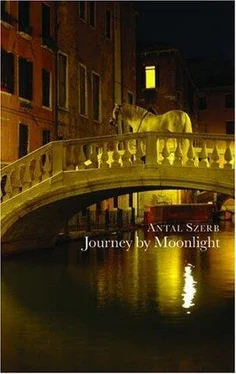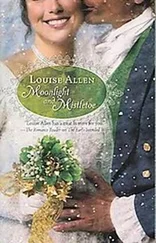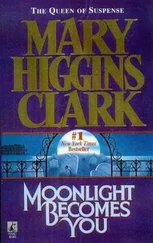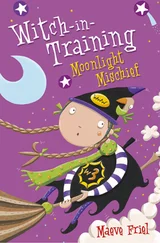“The only thing I inherited from my father,” he said with a smile, “was the fear of damnation.”
Here the roles were reversed. Mihály lived in terror of a great number of things, but hell was certainly not among them. He had little feeling for the afterlife. So he undertook to cure the doctor. A cure was urgently needed. About every third day the little English doctor would be seized by terrible fear.
The terror was not induced by bad conscience. He was a virtuous and kindly soul, with no obvious cause for self-reproach.
“Then why should you think you’ll be damned?”
“My God, I’ve no idea why I should be damned. It won’t be because of what I am. They’ll just take me.”
“But devils have power only over the wicked.”
“That we can never know. Even the prayer says it. You know: ‘Saint Michael Archangel, defend us in our struggles; be our shield against the wickedness of Satan and his snares. As God commands you, so we humbly beseech you; and you who command the Heavenly Armies, with the strength of the Lord deliver unto eternal damnation Satan and all the evil spirits who lead us into danger’.”
The prayer reminded Mihály of his school chapel, and the horror its words had always conjured up inside him as an adolescent. But it was not Satan and damnation that disturbed him. It was the prayer with its bleak reminder of bygone days. He generally thought of Catholicism as a modern phenomenon, which indeed it is, but that one prayer seemed like a relic of buried ages.
Whenever the terror of Satan seized him, Ellesley would hurry off to priests and monks for absolution of his sins. But this was of little use. For one thing, because he did not feel himself to be in sin, the act of forgiveness did not help. Another problem was that his confessors, for the most part, were simple country priests who persisted in carefully and repeatedly drawing his attention to the horrific nature of Satan, which merely made his condition worse. But at least the amulets and other magic charms were a help. On one occasion a saintly old woman blessed him with a sacred incense, and that kept him calm for two whole months.
“But what about you?” he asked Mihály. “Aren’t you afraid? What do you think happens to the soul after death?”
“Absolutely nothing.”
“And you have no hope of survival after death, and eternal life?”
“The names of great men live forever. I am not great.”
“And you can endure life on those terms?”
“That’s another question.”
“I don’t understand how anyone can believe that when a man dies he vanishes completely. There are a thousand proofs to the contrary. Every Italian can tell you that. And every Englishman. In all these two nations there isn’t a single person who hasn’t met with the dead, and these, after all, are the two most honest races. I had no idea Hungarians were so cynical.”
“Have you met with the dead?”
“Of course. More than once.”
“How?”
“I won’t describe it, it might just upset you. Although, one occasion was so straightforward it shouldn’t disturb you. I was a pupil at Harrow before the war. One day I was lying in my bed — with the ’flu — and staring out through the window. Suddenly I saw my father standing on the window sill in his naval uniform, saluting me. The only strange thing was that his officer’s cap had two wings, as in pictures of Mercury. I jumped up from the bed and opened the window. But he had gone. This was in the afternoon. That same morning my father was killed. That was the time it took for the spirit to get from Skagerrak to Harrow.”
“And the other occasion?”
“That was much more mysterious. It happened in Gubbio, not long ago. But that I really shouldn’t tell you about.”
“Gubbio? Why does that name seem so familiar?”
“Presumably from the legend of Saint Francis in The Little Flowers .”
“Of course, yes, the wolf of Gubbio … the one Saint Francis made a pact with, that he wouldn’t trouble the townspeople, and they in return provided him with food? … ”
“And every evening the wolf could be seen, with two baskets round his neck, going about the houses of Gubbio one after the other, collecting love-gifts.”
“Is this Gubbio still in existence?”
“Of course. It’s quite near here. You must visit it when you are better. It’s very interesting, not only for the wolf legend … ”
They talked a lot about England, Doctor Ellesley’s other home, which he greatly missed. Mihály too was very fond of England. He had spent two very serious, dreamy years there, before going on to Paris and home. In London he had wallowed in an orgy of solitude. Sometimes he went for weeks without speaking to anyone, just a few working men in suburban pubs, and then only a few words. He loved the appalling London weather, its foggy, watery softness, in which one can sink as low as the temperature in solitude and spleen.
“In London November isn’t a month,” he said, “it’s a state of mind.”
Ellesley readily agreed.
“You see,” Mihály continued, “now it comes back to me: in London one November I also experienced something which, with people like yourself, would no doubt have strengthened their belief that the dead somehow survive. In me it only strengthens the conviction that there is something wrong with my nervous system. Listen to this. One morning I was working down in the factory (as I said, this was in November) when I was called to the telephone. An unknown woman asked me to go without fail that afternoon, on important business, to such and such a place, and gave me an unfamiliar name and address. I protested that there must be some error. ‘Oh no,’ said this unknown female voice, ‘I’m trying to contact a Hungarian gentleman who works in the Boothroyd factory as a volunteer. Is there another one of that description?’ ‘No-one,’ I replied, ‘and you have my name correctly. But tell me, what is it about?’ She couldn’t say. We talked about it for some time and eventually I agreed to go.
“I went because I was curious. Is there any man who wouldn’t respond to the dulcet tones of an unknown woman on the telephone? If women really knew men they would ask us for everything over the telephone — in unfamiliar voices. The street, Roland Street, was in that rather forbidding bit of London behind Tottenham Court Road, just north of Soho, where the painters and prostitutes live who can’t afford Soho proper or Bloomsbury. I don’t know for certain, but I think it very likely that this is the part of London where you find the founders of new religions, Gnostics and the seedier kinds of spiritualist. The whole area gives off an aura of religious dereliction. Well, anyway, that’s where I had to go. You have to understand I am incredibly sensitive to the atmosphere of streets and places. As I made my way through the dark streets looking for Roland Street in the fog — it was mist rather than fog, a white, transparent, milky mist, typical of November — I was so overcome by this sense of spiritual abandonment I was almost seasick.
“I finally found the house, and a plate beside the door with the name given me by the strange voice on the telephone. I rang. After some time I could hear shuffling, and a sleepy slattern of a maid opened the door.
“‘What do you want?’ she asked.
“‘Well, I’ve no idea,’ I said, and felt rather embarrassed.
“Then someone shouted down, as from a long way off. The maid pondered this and for some time said nothing. Then she led me to a grubby little stairway and said, in the usual English way, ‘Just go straight up.’ She herself remained below.
“At the top of the stairs I found an open door and a room in semi-darkness. There was no-one in it. Just then the door opposite closed, as if someone had just that instant left the room. Remembering the maid’s instructions, I crossed the room and opened the door that had just closed. I found myself in another semi-dark, old-fashioned, dusty and tasteless room, with no-one in it, and again the door across the way closed, as if someone had just that instant gone out. Again I crossed the room and entered a third room, then a fourth. Always a door quietly closing before me, as if someone was walking ahead of me. Finally, in the fifth room … well, it’s an overstatement to say finally, because although there was no-one in that fifth room, there at least was no door closing before me. In this room there was only one door, the one I had come through. But whoever had been walking ahead of me was not in the room.
Читать дальше












